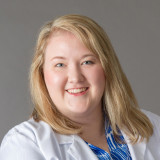Residency is hard. Anyone who tells you otherwise is lying. However, it is a time of learning, pushing yourself to the edge to reach your highest potential, and a chance to figure out your passions. I was fortunate that I already knew my desire to teach students but it definitely solidified it. Yet I still felt the burnout of the grueling hours of residency and felt cynical some days. If I’m speaking honestly, I would find myself thinking “These students don’t care, so why should I?” or “I don’t have time for this.” I would go home, reflect on the day and think to myself, “Sarah, you love teaching, so what’s the matter with you?” I never had the answer on those nights but I promised myself that I would have a new outlook the next morning and strive to be the teacher that I knew I was capable of being.
Fast forward to residency graduation. Four years of high-intensity training in obstetrics and gynecology filled with complicated obstetrics patients, fetal demises, some of the sickest patients I’ve ever seen battling gynecologic cancers, and my first gynecologic surgery complication. It was also filled with inflicted self-doubt, which was then followed by a year of working with other attendings to overcome my insecurities. During the month between graduation and starting my first attending job, which by the way I highly recommend, I read “What Doctors Feel” by Dr. Danielle Ofri. Maybe it was her wise words coming off the page and touching my heart or maybe it was the salty air of the beach as I read her book, but it was healing for me. When I read her chapter discussing medical students in our health care system, I realized that her stories hit home for my struggles and as I read further in her book, I realized that every emotion I felt during my four years of training was validated and explored. I knew that this needed to be shared and not when it was too late like for me; I wanted to help the future generations of doctors.
I was fortunate that my first attending job out of residency was one where I knew most everyone. I returned to my rural hospital, where I had done my rotations as a third and fourth-year medical student. To say I was intimidated would be an understatement, especially introducing anything new, even to colleagues I had known for years. Regardless, I approached our dean about my book club idea and after some persistence on my part, convinced him to let me share it with our third-year students as a creative way to build their professional identity outside of their structured curriculum.
When I first met with the students, I introduced it as a completely voluntary book club with their schedule in mind. I remember saying to the students, “As a resident, I thought I was a bad doctor because sometimes I struggled with how to process difficult emotions. I also thought that some of my thoughts made me a bad doctor until I realized that it was because I hadn’t been taught to manage through it, so that’s why I want to teach you.”
We met monthly to discuss a new chapter as well as whatever else was going on in their rotations and lives. I watched my students mature over that year of our book club and continue into their fourth year as they grappled with what it meant to take care of patients. We hugged as they exposed raw emotions while discussing their past experiences, as well as their fears for the future. I witnessed as they began to understand the frustration of health care and then empowered them with the idea that they can change the broken system. We discussed impostor syndrome and how real it is, but also how to overcome it as I actively conquered my own demon.
While I certainly have not changed the face of medicine, I explode with pride regarding my students, especially the first group, now interns in their respective fields and sharing their light with others.
Medicine is challenging, and equipping our youngest and brightest physicians is vital to the survival of our field. Although I have impacted only a small number with my book club tradition in subsequent years, these young doctors will go on to influence so many others in medicine and hopefully be the change needed in our health care system.
What's a book you wish you could share with your mentees or colleagues? Hold a mini book club for it in the comments.
Sarah Fisher, MD practices obstetrics and gynecology in Madisonville, Kentucky at Baptist Health Deaconess Madisonville where she serves as the OB/GYN clerkship director for the Trover Rural Campus of University of Louisville School of Medicine as well as section chair. She graduated from Geisinger in 2019.
Image by Denis Novikov / Getty






